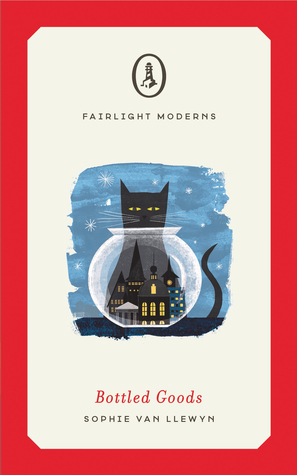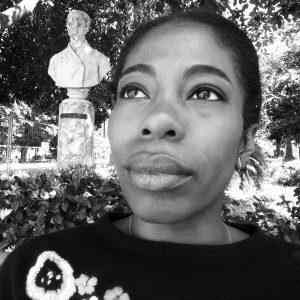
by Tiffany Sciacca
Sophie Van Llewyn’s debut flash novella, Bottled Goods, (Fairlight Books, July 2018) is the perfect place to start whether you are a longtime fan of flash fiction or new to this still evolving and exciting genre.
Bottled Goods, a collection of 51 stories, some as brief as a thought, others going for several pages, follows the life of Alina, native of communist Romania in the 1970s. Alina weds Liviu, yet their promising future is soon upended when Alina’s brother in law decides to defect to the West. Bottled Goods not only describes the toll taken on Alina and Liviu’s relationship but also other members of her family. It’s a fascinating watch, a slow descent like a series of coins going down a spiral wishing well.
From the title of the first story, “The Low People in Our Family,” I knew I was in for an interesting tale. In this story, we meet members of Alina’s family, one in passing. The opening is normal enough—the characters are on their way to a loved one’s funeral—and it is easy to get lulled into the banality of the journey; yet by the end, when her aunt tells her about her grandfather, who the communists were after and whose friends, were “killed, beaten, tortured,” I was left feeling uneasy but wanting more.
A better glimpse of Alina is revealed in the second piece, “Glazed Apples,” where she works in the midst of luxury at a Romanian resort but is confined to its underbelly. A clear line divides the haves and have-nots, with Alina firmly placed in the latter category. Although under communist rule, her job as a tourist guide allows her experiences she’d never have had otherwise, like setting eyes on the sea. And she must not only sell her country to visiting foreigners, but also her happiness as a citizen. It is at the resort where she meets Liviu and we witness the beginning of their relationship.
In “Prima Noctis,” we are uninvited guests at Alina’s wedding. This should be the happiest moment in her life but already we see what makes them different: the all-important fault line. Alina, who herself feels like an outsider “trapped in the bride’s body,” has come from money. Liviu’s family—rough, mountain people without airs—and the distinction Alina makes in her mind is startling as she feels “as dirty as any of them, a princess dragged through the mud.”
Bottled Goods is full of unique forms. From wish lists, as in “Dear Father Frost,” where we get a peek into Alina’s heart. Yearnings from the material, like a pair of Levi’s, to the practical needs, a portable electric stove. There are also entries in a diary, her handheld confessional, How-To lists, used to account meticulously for her missteps. And in “Quotes From My Mother (Commented) – Part I” we learn of Alina’s mother’s disapproval of her daughter’s marriage from the very first line. It is a point that she makes more than once, planting a seed that doesn’t take too long to take root. Postcards written to this same difficult and overbearing mother are another medium that allows the reader to follow the unraveling of Alina and Liviu’s story, though strictly from her perspective. I also appreciated the shift in voice throughout. Delivery is everything here and Van Llewyn displays the depth of her craft.
There are harbingers of ill-fated love and betrayal that go unnoticed, some more blatant including that elusive pair of Levi’s from “Dear Father Frost” and some that even the reader might miss on the first read. And as a marriage weakens, a country tightens its grip around the couple—love, trust, and loyalties tested throughout.
The defection of Alina’s brother-in-law does bring trouble, yes, but it is someone else’s misstep that proves detrimental. In the end, you may wonder if it was bad luck or a bad choice that seals everyone’s fate. Pay close attention and you will find the answer along with healthy doses of irony and karma.
Van Llewyn’s use of language is hypnotic and the worlds she creates stark and grotesque, calling to mind Shirley Jackson or Muriel Spark. With just the right details, whether it is the curve of a black Volga, sounds of bracelets around a wrist or faces “like cassettes with their tape pulled out,” your eyes will devour the pages as you are led through stories that turn from the supernatural to the hyper-real. Sophie Van Llewyn knows her Romanian history and lore but nothing feels forced or unnatural and you will find yourself hitting the last page of Bottled Goods quicker than you wanted.
Bottled Goods is available from Fairlight Books and elsewhere online.
______________________________


 The core workshop of SmokeLong Fitness is all in writing, so you can take part from anywhere at anytime. We are excited about creating a supportive, consistent and structured environment for flash writers to work on their craft in a community. We are thrilled and proud to say that our workshop participants have won, placed, or been listed in every major flash competition. Community works.
The core workshop of SmokeLong Fitness is all in writing, so you can take part from anywhere at anytime. We are excited about creating a supportive, consistent and structured environment for flash writers to work on their craft in a community. We are thrilled and proud to say that our workshop participants have won, placed, or been listed in every major flash competition. Community works.